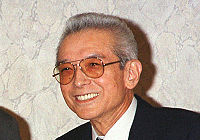| Site Notice |
|---|
|
We have a limited coverage policy. Please check our coverage page to see which articles are allowed. |
Hiroshi Yamauchi
Hiroshi Yamauchi (Japanese: 山内溥 Yamauchi Hiroshi, November 7, 1927 - September 19th, 2013) was the third president of Nintendo, from 1949 until stepping down on May 31, 2002, and was thus the head of the company during the first 8 years of the Pokémon franchise. Yamauchi is credited with transforming Nintendo from a small hanafuda card-making company to the multi-billion dollar video game company it is today. Yamauchi was succeeded at Nintendo by Satoru Iwata.
As of April 2013, Yamauchi was the thirteenth-richest person in Japan, and 491st richest person in the world, having a net worth of approximately $2.5 billion.[1]
Yamauchi died on 19 September 2013, aged 85.[2]
Career in Nintendo
Yamauchi, who was born in Kyoto, Japan, became the president of Nintendo after his grandfather, Sekiryo Yamauchi, had a stroke in 1949. At Sekiryo's request, Hiroshi left Waseda University to assume his new position, but with one condition: that he would be the only family member working at Nintendo. Hiroshi's grandfather reluctantly agreed, and died shortly after. Under these terms, Hiroshi's older cousin had to be fired. Hiroshi's young age and lack of management experience caused problems for him at first, as most employees did not take him seriously, and even started a strike. He dealt with the strike by firing many long-time employees who questioned his authority. He had the company name changed to Nintendo Karuta and established its new headquarters in Kyoto. He was the sole judge of potential new products, and only a product that appealed to him went on the market.
Yamauchi was the first person to introduce the Western plastic playing card into the Japanese market. His first major success came when he made a licensing agreement with Walt Disney in 1959 for his plastic playing cards. Nintendo's Disney playing card was also accompanied by a small, thin booklet with many tutorials for different card games. The strategy succeeded and the product sold 600,000 units in one year, soon gracing Nintendo with the domination of Japanese playing card market. Hiroshi once again changed the company name to Nintendo Company Limited and took the company public (listed on stock market).
One day, Yamauchi spotted a factory engineer named Gunpei Yokoi playing with a simple extendable claw, something Yokoi made to amuse himself during his break. Yamauchi ordered Yokoi to develop the extendable claw into a proper product. The product was named Urutora Hando (Ultra Hand) and was an instant hit. It was then that Hiroshi decided to move Nintendo's focus into toy making. With an already established distribution system into department stores for its playing cards, the transition was a natural one for Nintendo. Hiroshi created a new department called Games and Setup, manned initially by only Yokoi and another employee who looked after the finances, and was situated in a warehouse in Kyoto for the purpose of research and development.
Years later, in 1995, the Virtual Boy was released, but did not sell well. Despite the bust, Hiroshi said at a press conference that he still had faith in it and that the company would continue developing games for it. Primary developer Gunpei Yokoi was heavily criticized for the failure leading to his eventual resignation from Nintendo after 30 years of service.
The following year, Nintendo released its new, fully 3D console, the Nintendo 64. Simultaneously, Super Mario 64 was launched as the first fully 3D platform game. In 1999, Yamauchi and Nintendo announced their intentions to work on a new system, the Nintendo GameCube, with IBM Gekko processor and Matsushita DVD technology Dolphin. Yamauchi touted the Nintendo GameCube as a machine designed exclusively to be a video game console - an approach which he considered different from Microsoft's and Sony's for their respective Xbox and PlayStation 2 consoles.
On May 31, 2002, Yamauchi stepped down as president of Nintendo and was succeeded by the head of Nintendo's Corporate Planning Division, Satoru Iwata. Hiroshi Yamauchi subsequently became the chairman of Nintendo's board of directors. He finally left the board in June 29, 2005, due to his age, and because he felt that he was leaving the company in good hands. Yamauchi also refused to accept his retirement pension, which was reported to be around $9 million to $14 million, feeling that Nintendo could put it to better use. He remained Nintendo's second-largest shareholder until his death.[2]
